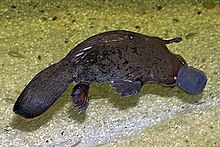platypus
See also: Platypus
English

Etymology
From New Latin Platypus (originally a genus name already in use for a type of beetle), from Ancient Greek πλατύπους (platúpous, “flat-footed”), from πλατύς (platús, “flat”) + πούς (poús, “foot”).
Pronunciation
Audio: (file) - Lua error in Module:parameters at line 239: Parameter 1 should be a valid language or etymology language code; the value "RP" is not valid. See WT:LOL and WT:LOL/E. IPA(key): /ˈplætɪpəs/
- Lua error in Module:parameters at line 239: Parameter 1 should be a valid language or etymology language code; the value "GA" is not valid. See WT:LOL and WT:LOL/E. IPA(key): /ˈplætɪˌpʊs/, IPA(key): /ˈplætɪpəs/
Audio: (file) - Hyphenation: pla‧ty‧pus
Noun
platypus (plural platypuses or platypus or (common, hypercorrect, pseudo-Latin) platypi or (rare, nonstandard) platypodes)
- A semi-aquatic, egg-laying monotreme mammal with a bill resembling that of a duck, that has a mole-like body, a tail resembling that of a beaver, a waterproof pelt, and flat webbed feet — males have poisonous spurs on the inside of the back legs; Ornithorhynchus anatinus
- 2008 March 2, “Captive platypus twins make history”, in ABC News[1]:
- Victoria's Healesville Sanctuary is celebrating the births of two baby platypuses, in a major milestone.
Quotations
- For quotations using this term, see Citations:platypus.
Synonyms
Derived terms
Translations
Ornithorhynchus anatinus
|